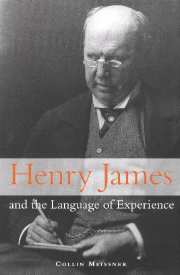Book contents
- Frontmatter
- Contents
- Acknowledgments
- Chapter 1 The experience of Jamesian hermeneutics
- Chapter 2 The experience of divestiture: toward an understanding of the self in ‘The American’
- Chapter 3 Bondage and boundaries: Isabel Archer's failed experience
- Chapter 4 Lambert Strether and the negativity of experience
- Chapter 5 Recovery and revelation: the experience of self-exposure in James's autobiography
- Notes
- Bibliography
- Index
Chapter 3 - Bondage and boundaries: Isabel Archer's failed experience
Published online by Cambridge University Press: 22 September 2009
- Frontmatter
- Contents
- Acknowledgments
- Chapter 1 The experience of Jamesian hermeneutics
- Chapter 2 The experience of divestiture: toward an understanding of the self in ‘The American’
- Chapter 3 Bondage and boundaries: Isabel Archer's failed experience
- Chapter 4 Lambert Strether and the negativity of experience
- Chapter 5 Recovery and revelation: the experience of self-exposure in James's autobiography
- Notes
- Bibliography
- Index
Summary
She was a person of great good faith, and if there was a great deal of folly in her wisdom those who judge her severely may have the satisfaction of finding that, later, she became consistently wise only at the cost of an amount of folly which will constitute almost a direct appeal to charity.
Henry James, The Portrait of a LadyThen we,
As we beheld her striding there alone
Knew that there never was a world for her
Except the one she sang and, singing made.
Wallace Stevens, “The Idea of Order at Key West”About a quarter of the way through The Portrait of a Lady Isabel Archer and Ralph Touchett carry out a seemingly innocent conversation which underscores James's conception of art's civic and heuristic value. I am referring to the conversation in which we find Ralph Touchett, sick and dying, confessing to Isabel his inability to participate actively in life and his desire, therefore, to observe Isabel live hers: “What's the use of being ill and disabled and restricted to mere spectatorship at the game of life if I really cannot see the show when I have paid so much for my ticket?” (3:209–10). Touchett's plea awakens in our memory the Jamesian artist isolated, peering down on the human scene from behind a window in the house of fiction.
Information
- Type
- Chapter
- Information
- Henry James and the Language of Experience , pp. 80 - 128Publisher: Cambridge University PressPrint publication year: 1999
